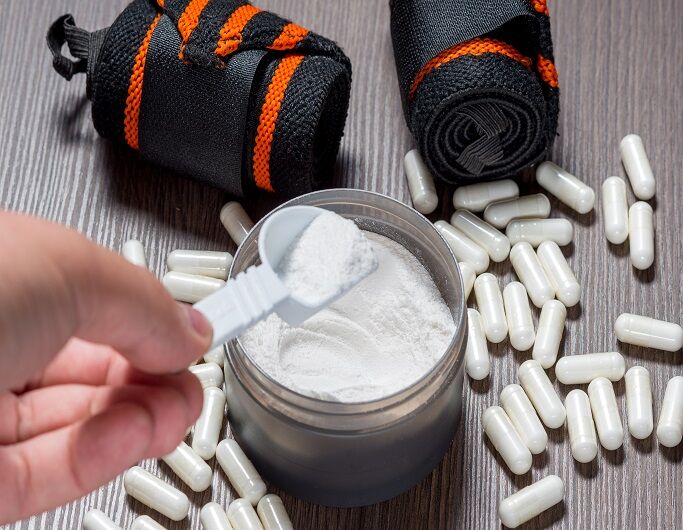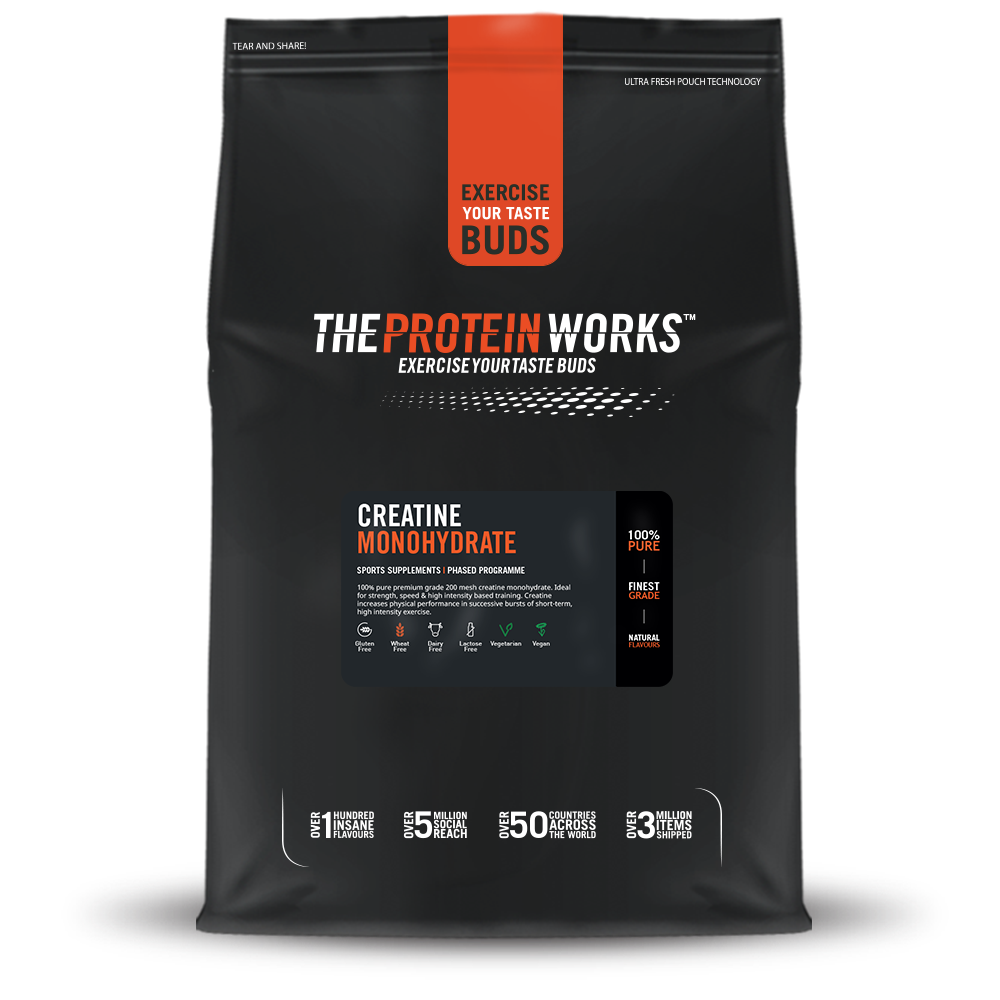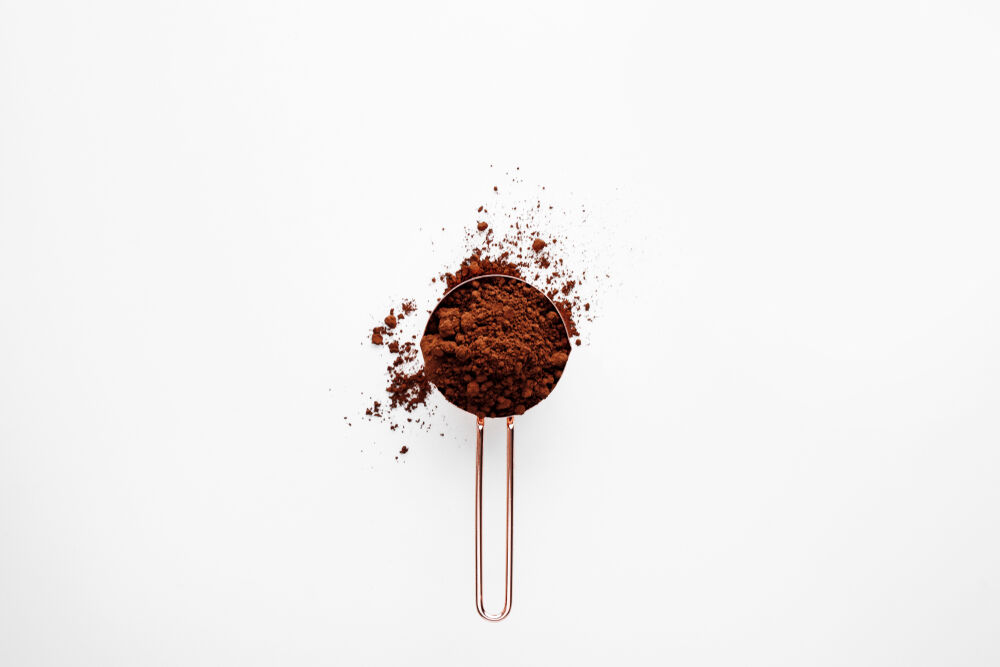The Only Discussion of Creatine You’ll Ever Need
Creatine might just be the best supplement ever.
It’s a big deal in building muscle, but there are huge hidden benefits we’ve ignored for too long – despite being the most important muscle-building supplement for the average joe and elite competitor alike!
Today, we’re going to outline everything you’ll ever need to know about Creatine, what this unassuming white powder can do for you, and how you can make the most of it.
Creatine: A Quick Guide
Even if you’re new to health and fitness, you’ll probably have heard of this king of supplements. It’s been popular with muscle and strength enthusiasts for decades – from Olympians to Mr Olympia.
Why have we seen this much popularity? Easy question:It’s simple and it works.
So, you’re wondering: what can creatine do for you?
Creatine keeps strength and power high when you’re starting to get tired. It does this by providing a ‘reservoir’ of ingredients to build high-energy fuel for your muscles. Called ATP, this compound is the key to your maximum strength and how long you can keep going for.
This is essential, whatever your fitness goals may be.
Hundreds, if not thousands, of studies have shown that Creatine’s results are real and reliable. It’s the most well-studied supplement in all of sports nutrition. We know that if you can train for longer at ‘stimulating’ weights, you can improve your results.
Does Creatine Work?
We get asked this question all the time.
Yes, but there’s a lot more to it than you might think!
What you Already Know About Creatine: Muscle-Building Goodness
You gain muscle when you put your muscles to work against challenging weights. Creatine is great for this as it directly improves your ability to produce force and power in many studies. This means direct improvements in strength and power.
Creatine increases the signalling and processes dictating your muscular growth and recovery. It plays a key role in the recovery process so, whether you’re looking to build muscle or you’re an athlete trying to maintain peak performance, this is a great supplement choice.
However, by increasing your strength-endurance, Creatine indirectly boosts your ability to build muscle: you can produce more force, more times, before fatigue sets in. This is key because we’ve already seen that you’re likely to lose 50-60% of your energy resources during light exercise!
Underrated Benefits of Creatine Supplementation
Have you ever taken Creatine while you’re on a weight-loss diet?
It might sound crazy to many people, but this is one of the most important times during which to supplement this key nutrient. Because you’re eating less, your dietary intake is going to drop, and you’re going to be at risk of having less energy, losing strength, and losing too much muscle while you cut.
While the early days of creatine supplementation can result in a little water retention, it’s still a NET win. It’s a minimal weight change and there are 3 key advantages:
- The weight is temporary and will come off rapidly after you stop taking creatine;
- Unlike normal water retention, this weight is primarily held in the muscles rather than just the fat cells;
- You’re going to see much better results in muscle mass and strength, far outweighing this weight change!
Supplementing during this time is fantastic, as Creatine may reduce muscle-loss during weight-loss. This makes it key for your diet – especially if you’re interested in healthy aging, keeping your hard-earned muscle or staying strong.
Is Creatine a Vitamin? Should it be?
You’ve probably never heard this question, because everyone’s too distracted by the muscle-building properties of Creatine that they missed the rest!
Creatine has amazing long-term health Benefits – and they’re not just related to being jacked (but that too). Recent studies have shown that there are three key areas of potential benefits you need to know:
- Heart health and CVD risk
- Brain health and degenerative disease risk
- Cellular health, aging and cancer risks
The Heart
For example, Creatine may have a protective effect on your heart. It can reduce the levels of harmful compounds (such as homocysteine) that are associated with heart disease and poor artery health. This may contribute to reduced overall risk.
Studies also suggest that Creatine has mechanisms to improve artery health and combat plaque build-up.. These are important because they are big risk factors in heart attack and stroke – the two most common causes of death.
The Brain
Creatine supplementation also has implications for brain health. Deficiency in Creatine (a real condition) is associated with neurological ill-health from fatigue to stunted mental development. The science already points to energy deficiency as a real risk to the brain. With benefits to energy metabolism, creatine may have a role in a brain-healthy diet.
There’s a difference between being “non-deficient” and optimal. Supplementary creatine intake is something that may benefit healthy people on a day-to-day basis and could be a key supplement for mental health and performance.
Aging and Oxidation
Finally, the positive effects of Creatine on energy status in your body improve cell health and reduce the risk of oxidation-related illness. This can contribute to healthier aging, improved organ function and less cell-death.
Creatine may produce favourable responses across a wide variety of health markers. Energetics are essential in good health. By improving your energy metabolism and improving cell health, Creatine shows itself to be far more than just a muscle supplement. Some expert observers have even stated:
“I see no reason why somebody shouldn’t supplement Creatine […] it’s safe, it’s healthy, it’s cheap and for most people it just works”
Making Creatine Work for You
If you’re now realising that you should be taking Creatine and that you’ve been missing out this whole time (which you have), you need to know how best to use it.
Creatine is cheap and plentiful, but you should start with the dosing. A recommended daily dose is around 0.02-3g/kg of bodyweight. For a 100kg man, this means 3g/day for consistent use without “cycling off”.
This is because Creatine is a key nutrient, not a steroid, and it doesn’t down-regulate. You wouldn’t cycle off of a multivitamin, for example.
Different Types of Creatine
This is actually a really simple issue. Creatine monohydrate is the most effective and affordable form on the market. You can get a micronized version that has superior mixing with water, but the actual effectiveness is similar.
One way to deal with Creatine is to get a mixture or blend, that offers a combination of different forms. Some of these are more effective for certain purposes. For example, sodium-Creatine sources are a great way of improving re-hydration after exercise which can be a boost to your recovery and muscle growth.
Simply put, Creatine monohydrate is definitely good enough, but there are some perks to other forms if you’re concerned with getting the very best results. They’re dependent on goals and how you use them, however – the average joe won’t need to worry about it too much.
How Does Front-Loading Creatine Work?
You don’t need to load Creatine, but it is an easy way of rapidly getting results. Otherwise, you’re probably going to need to wait around 2 weeks to see any major improvements.
To load Creatine, you should spend 3-5 days at 10x as much as you would normally take. The easiest way to do this is to take your bodyweight, get 30%, and take that many grams of Creatine. After this short period of front-loading, you can drop down to ‘normal’ intake and you’ll see a faster response to your supplementation.
Frequency and Timing: When Should you Take Creatine?
The research isn’t final on the perfect time to take your Creatine. Some studies suggest that you should take it before exercise, while others still suggest that you should take it afterwards.
What we do know is that Creatine should be consumed closer to exercise, rather than just in the morning. If you can supplement within 2-3 hours either side of intense exercise, you’re going to see an improved response – especially if you use our nutrient synergists discussed below. This makes it a great addition to your normal post-workout meal or shake.
However, this isn’t a make-or-break decision: there are a lot of factors in nutrient timing and these studies can’t control for everything. It may make the most sense to take half of your daily dose on either side of a workout – especially since Creatine has been shown to improve re-hydration and, thus, muscle growth and recovery after a hard workout.
Creatine Synergists: What Should you Take with Creatine?
The foods and nutrients you consume at the same time can have an impact on the results you see. Creatine is best taken alongside other key nutrients, producing the best results with the same ingredients.
- Alpha Lipoic Acid
This one ties in with insulin and carbohydrates, which we’re going to look at below.
To keep it short, ALA is a great combination with fast-absorbing carbs and Creatine. Studies show that these greatly improve how quickly you can absorb and use Creatine.
This is even more reason to use Creatine post-workout with your existing carb and protein shake. Try adding ALA powder to up your recovery game.
- Beta-Alanine
Beta-alanine is the Creatine of the endurance world. Creatine improves strength-endurance and Beta-Alanine improves regular endurance.
What do you get when you combine the two? Extra results, according to the science. Supplementing both of these compounds at the same time improves your response to Creatine loading – up to as much as 4 weeks!
This is the exact reason that we’ve included Beta-Alanine in our Creatine Extreme blend to boost performance in strength and endurance.
- Caffeine
The relationship between Creatine and caffeine is complicated, but they conflict if you take them together. They compete for their individual effects on your muscular system and you should avoid consuming them at the same time.
However, if you reduce the frequency of caffeine intake and use caffeine and Creatine at different times before an especially tough workout, you can get the most out of both without any competition. Take Creatine 2-3 hours before, and Caffeine about 15 minutes before your top set.
Save this for those sessions that involve lots of heavy sets, new personal bests, and any other ‘testing’ event!
- Carbohydrates
During the loading phase, Creatine, Protein and carbohydrates should be consumed together post-workout. This increases the insulin response, causing more effective use of carbs and creatine during the “window” of nutrient-sensitivity after a tough workout.
You should be consuming protein and carbs post-workout, so try adding creatine to induce maximum muscle protein synthesis after a workout and replenish lost energy stores.
- Leucine
Leucine is king of the amino acids for anyone that wants to gain muscle or improve their performance in sport and exercise.
Leucine is one of the most important amino acids for signalling to your body that it’s time to build muscle. This works on a system called the mTOR pathway, which provides your body with the feedback that you have the right environment for muscle growth.
This pathway requires energy and dietary protein. Your overall calorie and Creatine intake prove that you’ve got the first, while leucine is used to promote the latter. Overall, this combination of supplements can improve your signalling for muscle growth, letting your body know that it has all the raw materials for muscle recovery and growth.
The Ultimate Creatine FAQ
Is Creatine safe?
For the vast majority of people, Creatine is safe. Despite concerns over creatinine levels in the kidneys, there’s no reliable research that links Creatine to any health problems mechanically. It simply doesn’t do any damage in reasonable doses.
- Does it cause cancer?
Firstly, nothing causes cancer. You have a cancer risk profile with a lot of sliding variables that increase/decrease your risk.
Creatine is not one of them: Recent studies have shown that creatine may actively reduce cancer risk by improving cell energetics and reducing the risk of cell-death and serious mutation problems.
- Does it cause kidney problems?
There was always some concern about the kidney risks of compounds like Creatine and protein. However, these aren’t based in reality: even loading-doses are healthy in individuals with a single kidney without any negative effects. You (probably) have two, so you’ve got nothing to worry about.
Creatine is healthy for everyone – one kidney or two – without existing kidney problems or on a course of diuretics. If you’re in either of these situations, the best solution is to simply consult your healthcare professional.
- Does it cause testicular problems?
This is also a no- there are no real problems associated with Creatine intake. This has been discussed because testicular damage results in increased creatine in the urine. The problem with this association is that it’s the other way around: healthy testes contain the compound, but damaged ones result in these stores leaking into the urine. Creatine is the symptom, not the cause!
As with cancer, the improved cellular metabolism that comes with Creatine supplementation reduces cell damage and the chance of testicular cancer. This is especially important for the testes as they account for some of the 2% of Creatine in the body that is stored outside of skeletal muscle.
Basically, it’s fine and you don’t need to worry about your testicles (if you have them).
Does Creatine make you hold water?
Sort of.
There’s a difference between creatine water-retention and the kind you get from eating too much salty junk food. The main difference is that a lot of the water retention you get from Creatine is held in the muscles, rather than the fat cells.
This means that 5lbs of water weight will look very different with this nutrient than it would as the result of a high-sodium diet. You’re going to see muscle fullness, improved organ hydration and – yes – a small amount of water retention/”softness”.
What happens when you come off?
Very little happens when you come off creatine. You will lose the water you’ve been retaining and drop around 3-5lbs in around as many days.
You’ll notice some decreases in strength and strength-endurance after this time is up, but that’s the trade-off for the weight-loss. After all, that’s what supplementing was for in the first place!
Who should take Creatine?
Despite the fact that we think everyone should take Creatine that can (without risk of health complications), there are some exceptions and some who definitely should/shouldn’t.
People who should take creatine include:
- Muscle and Fitness enthusiasts (especially those who are getting into their 40s)
- Anyone dieting down but looking to keep muscle mass
- Strength athletes (like Powerlifters and Weightlifters)
- Team sports that involve high-intensity play (like Rugby)
- Anything without a weight category!
- Anyone concerned with healthy aging, reducing risk of chronic illness and staying healthy
People who shouldn’t take creatine (without a doctor, at least):
- Anyone with a history of kidney problems that hasn’t been cleared by their doctor
- “Non-responders”: people who have used creatine before but have no response
- Athletes in sports where weight-categories are tightly-controlled and those 3-5lbs of water are a problem (use creatine/ALA/Carbs for re-hydrating, however)
Closing Remarks
We’re closing this article out by reminding you that Creatine is one of the most effective supplements ever – it should take a central role in your performance nutrition.
We’ve detailed why – from the health and performance benefits to how it interacts with other nutrients, and how you can make the best-use of it. It’s a key nutrient, much like other vitamins and minerals, and it deserves that recognition.
We agree with Khalil from Examine and his analysis: if you’re a healthy individual with any concern for your health and fitness, you need to be supplementing Creatine.
We’ve armed you with the knowledge you need to navigate the market and take control of your own health and fitness. If you’re looking for a top-quality supplement that fits all these important categories, check out our line of Creatine products.








No Comments yet!